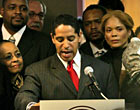New Orleans It is a huge advantage to have been doing this work for a very long time. In many cases you find that you have out run your opponents and by dent of experience, discipline, and just showing up every day for more than 35 years, you just know a lot more people and can watch the gears move slowly enough to get ahead of the train sometimes. At least this is how I like to think about the value of seniority in social change.
I also have to admit to believing that the soaring heat of the sixties has boiled many of us in a caldron that seared our values so deeply that the scars have touched our souls in a way that protects our commitment and actions in the present and future. I give a lot of latitude to comrades sharing the trials and tribulations over a vast period of time. I think they’ve earned it. I think we’re all more alike than different somehow. I cut them more slack in the rope.
Saying all of that I have to admit to reading the reports of Martin Ludlow’s demise in Los Angeles with real sadness. I can not reconcile all of this with my worldview. That makes me unhappy, frankly.
I met Martin Ludlow when he was political director of the Los Angeles County Federation of Labor. I was introduced by my old comrade, Jon Barton, years ago when he was the organizing director for the fed at the same time. Ludlow later was elected as a city councilman. ACORN endorsed him. He then came back as head of the county fed after the untimely death of Miguel Contreras. Miguel had been on the Organizers’ Forum board. We were in the process of recruiting Ludlow to take his place, when the castle collapsed. Ludlow agreed to a plea with the feds that will involve paying fines and restitution of $186,000 along with a 4-year ban from elected office and a 13-year prohibition on holding a leadership position in a union.
But, we were not close to Ludlow in the same way that we were close to too many of the other players in this drama. Reading the Los Angeles Times from March 4th and some of the earlier articles, the real sadness is the fact that we knew virtually all of the rest of the people who were involved in this mess.
Ludlow agreed that he had been involved in an “okey-dokey” deal with the political operations run by SEIU Local 99, the giant school support workers local in Los Angeles. The phone and political operations were run by Tom Newbery, an old friend. Tom had been a community organizer with the Citizens’ Action League in the mid-1970’s. We had worked with him during those days trying to help on some payroll and tax problems. We had known Tom when he migrated to SEIU. His phone trucks were amazing. They had made calls for us. Ludlow admitted getting a bunch of help under the table from Tom and Local 99.
A couple of years ago SEIU trusteed Local 99 and booted out Tom and the President, Janett Humphreys. She was now being indicted on two counts for the same mess and has vowed to fight. I sat with her at SEIU board meetings of various types on many a day. She was also accused of having padded her accounts, charged off airplane tickets and stuff for fancy affairs. She never seemed the type.
Ludlow also pleaded out having given Gregory Akili an envelope with $1300 in cash and directing him to give it to another staff member for work on his campaign. Campaign finance reports didn’t mention this expenditure. Ludlow later directed Akili “to create antedated work product” — which in English means to make up something and put an earlier date on it. Akili according to the Los Angeles Times, as well as other “phantom” union workers are cooperating with the prosecutors on this mess.
I have known Greg Akili since 1978. He was working with the Domestic Workers Union in San Diego and elsewhere in California at the same time I had gone to New Orleans to start a project organizing the Household Workers Organizing Committee for ACORN. We used to talk on the phone and compare notes. Over the years I would run into him from time to time. He would show up working for various unions or political campaigns all over the country (including a race in Alexandria, Louisiana!), but mostly in southern California. Now everyone was running for their lives and he seems to have been doing the same.
I want to be able to read the paper and tut-tut about these kinds of cases. I want to believe that “our side” doesn’t do what their side does. Frankly, I don’t want to admit to knowing this many people on the other side of the line.
Why does this happen?
Has the easy morality of “us versus them” and our constant view of ourselves as poorly funded underdogs, led us to believe that it’s somehow all right for us to go over the line? Do we not have clear boundaries around values, morals, or law that protect us in these fights from short-cuts that go past the lines? How could we not have learned these lessons way before we had 20, 30 or more years in the work?
A lot of rationalizations come to mind, but I don’t find any of the answers easy.
I don’t like knowing this many people in a mess.
We need to make sure we know fewer in the future, but somehow that doesn’t seem possible until we understand how slippery this slope has become and how hard it seems to find solid ground.
March 6, 2006
